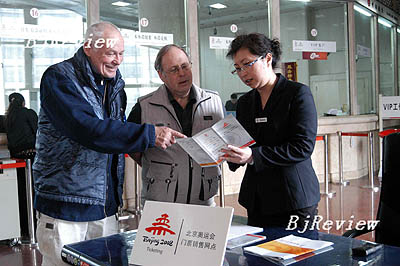|

There are some 7 million tickets on sale for the 2008 Beijing Olympic Games, which can be applied for on the official ticket-booking website, via outlets of Bank of China and through the mail.
However, the appearance of the tickets remains a secret and lucky ticket holders will not get a chance to see them until June.
As the games grow closer, the value of Olympic tickets is rising. A 5,000-yuan A-type ticket for the opening ceremony was recently on sale for 190,000 yuan ($27,000) on the Internet, a newspaper from Shandong Province reported.
The fortunate ticket holder was one of just 26,000 members of the general public nationwide who has a seat for the opening ceremony.
"After I posted to sell my ticket I received many phone calls, but no one has actually bought it yet," said the ticket holder.
Staff at the Olympic ticket center said there had been some cases of people transferring tickets at extraordinarily high prices.
The Beijing Organizing Committee for the Games of the XXIX Olympiad (BOCOG) has developed policies to regulate the selling on of tickets. The regulation rules that normal tickets can be sold on after they have been paid for, but ticket sales for the opening and closing ceremonies must be approved by BOCOG. As these tickets are sold via a real name system, if the holder wants to sell their ticket, they must go to the ticket center to make the transaction. Each ticket can be transferred only once.
"Consumers have to be cautious about ticket transactions on the Internet as some might be fake," warned one staff member at the ticket center.
Buying in tickets and selling them on at a profit is also forbidden. According to a spokesperson from the Beijing Public Security Bureau, the local police have already enhanced patrols around sports venues in an effort to catch scalpers.
RFID technology
Fake tickets are easy to identify as genuine tickets carry an anti-fake chip.
"It is just like an IC card used on the buses. You just put the ticket on the examining machine and the machine identifies it as real or fake in 0.1 of a second," said Ren Hongzhou, who is in charge of the ticket technology, which is called Radio Frequency Identification (RFID).
The RFID tech has already been used in China's second-generation ID card, but this is the first time it has been applied to the ticket system of the Olympics. The technology was tried out at the 2006 FIFA World Cup in Germany, but was not fully implemented for a variety of reasons. It was not used at the 2004 Athens Olympic Games as the technology was not mature and the cost of using it was high.
It took about one year to develop the anti-fake chip, the average cost of which is around 5 yuan ($0.69), according to Ren.
The chip does not contain the personal information of the ticket holder but has a unique serial number that fits a "secret key" within the machine, which displays a photo, name and other information of the ticket holder. "It is like there's key to the safe in the checkup machine. The serial number and the key have to be matched so that the audience can be admitted to the venues," said Ren.
"Even the tickets for the opening and closing ceremonies don't contain any personal information with them to prevent the leak of privacy," explained Ren. The personal information is stored in remote servers. The information will be displayed on a screen behind the checkup machine, including a photo, name, sex, nationality, age and ID number. "At the same time, a camera will scan the ticket holder's face so that the checkup worker can compare the two faces without having to look at the face of the ticket owner. This saves time in the checkup process," explained Ren, adding that personal information will be destroyed when the Olympic Games is over.
"The smaller we make the chip, the smaller the chance that it will be broken. So our team has made it just 1 mm squared and at the same time the cost has been reduced," he noted.
Ren recalled how the technology officials of the International Olympic Committee (IOC) tested the quality of the ticket. They were folding, tossing and pouring water over it. After all the "torture," the ticket still worked.
In case a ticket cannot be recognized, a small keyboard is available by the side of the checkup machine. The serial number of the ticket can be typed via the keyboard to see the detailed information.
The checkup machine also has a unique serial number. If it is stolen the machine will automatically lose all its functions.
The RFID technology has undergone real tests during the Good Luck Beijing events. "I was so surprised to see there were fake tickets. How could it happen?" Ren recalled, before disclosing that the IOC had deliberately produced a batch of fake tickets to test the RFID system.
"Some of the fake tickets did not have chips at all and some had been installed with other chips. All of them were identified and the system worked 100 percent correctly," noted Ren. | 